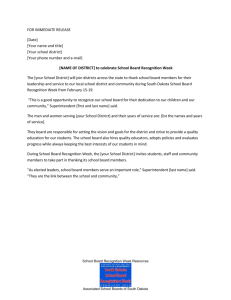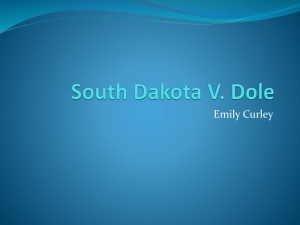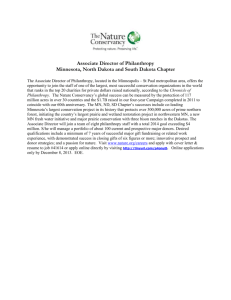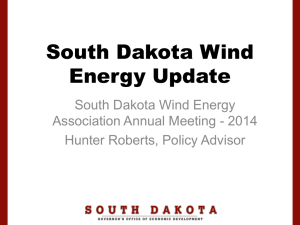Ecosystems, Conservation, Habitats and Outdoor Activities
advertisement
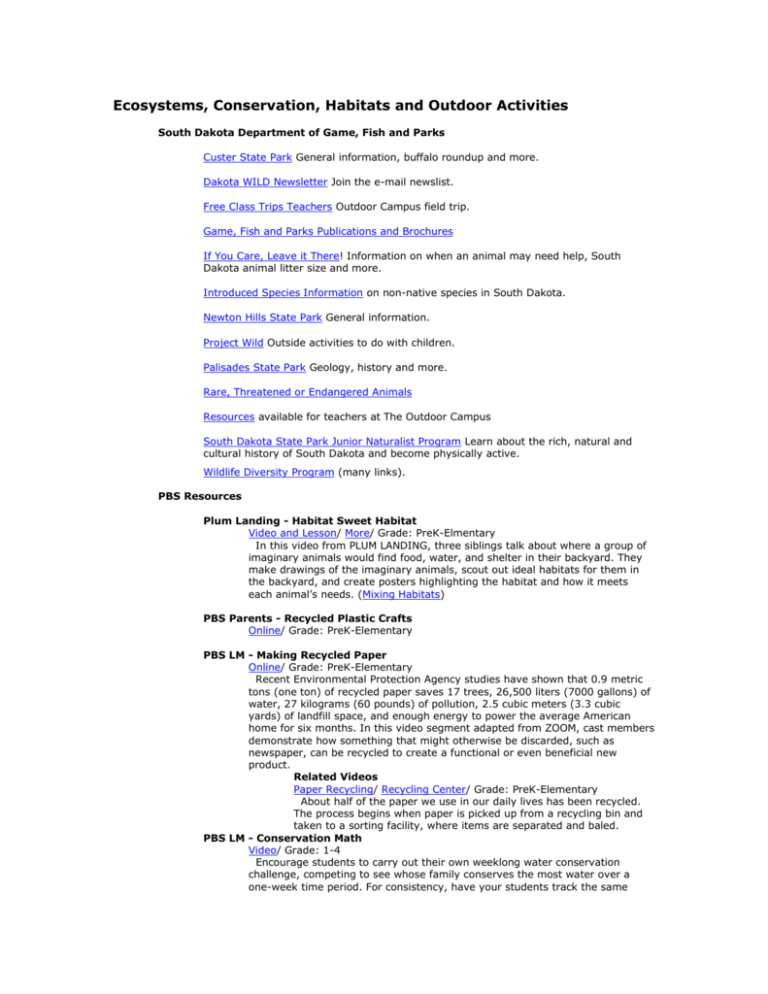
Ecosystems, Conservation, Habitats and Outdoor Activities South Dakota Department of Game, Fish and Parks Custer State Park General information, buffalo roundup and more. Dakota WILD Newsletter Join the e-mail newslist. Free Class Trips Teachers Outdoor Campus field trip. Game, Fish and Parks Publications and Brochures If You Care, Leave it There! Information on when an animal may need help, South Dakota animal litter size and more. Introduced Species Information on non-native species in South Dakota. Newton Hills State Park General information. Project Wild Outside activities to do with children. Palisades State Park Geology, history and more. Rare, Threatened or Endangered Animals Resources available for teachers at The Outdoor Campus South Dakota State Park Junior Naturalist Program Learn about the rich, natural and cultural history of South Dakota and become physically active. Wildlife Diversity Program (many links). PBS Resources Plum Landing - Habitat Sweet Habitat Video and Lesson/ More/ Grade: PreK-Elmentary In this video from PLUM LANDING, three siblings talk about where a group of imaginary animals would find food, water, and shelter in their backyard. They make drawings of the imaginary animals, scout out ideal habitats for them in the backyard, and create posters highlighting the habitat and how it meets each animal’s needs. (Mixing Habitats) PBS Parents - Recycled Plastic Crafts Online/ Grade: PreK-Elementary PBS LM - Making Recycled Paper Online/ Grade: PreK-Elementary Recent Environmental Protection Agency studies have shown that 0.9 metric tons (one ton) of recycled paper saves 17 trees, 26,500 liters (7000 gallons) of water, 27 kilograms (60 pounds) of pollution, 2.5 cubic meters (3.3 cubic yards) of landfill space, and enough energy to power the average American home for six months. In this video segment adapted from ZOOM, cast members demonstrate how something that might otherwise be discarded, such as newspaper, can be recycled to create a functional or even beneficial new product. Related Videos Paper Recycling/ Recycling Center/ Grade: PreK-Elementary About half of the paper we use in our daily lives has been recycled. The process begins when paper is picked up from a recycling bin and taken to a sorting facility, where items are separated and baled. PBS LM - Conservation Math Video/ Grade: 1-4 Encourage students to carry out their own weeklong water conservation challenge, competing to see whose family conserves the most water over a one-week time period. For consistency, have your students track the same types of water usage as the kids in the video: number of times the toilet is flushed, length of time for showers, and length of time water runs while washing hands or brushing teeth. Cyberchase: Trash and Protecting the Environment Watch Online / Activity / Grade: Elementary The Cybersquad take action when a giant garbage heap threatens to break the cybersite's dome. Cooking with the Sun (Quick Overview) Going Solar (Ep. 902) Entire Program/ Activity Chomp, Nibble, Grow, Grow, Grow An Urchin Matter (Ep. 901) Entire Program/ Activity Dragonfly TV Baby Animals Dragonfly TV investigates baby animals. Activity guide, watch program online and more. Garbology (Reduce, Reuse, and Recycle Lesson Geysers Dragonfly TV investigates geysers. Activity guide, watch program online and more. Glaciers Dragonfly TV investigates glaciers. Activity guide, watch program online and more. Rivers Dragonfly TV investigates rivers. Activity guide, watch program online and more. Rocks Dragonfly TV investigates types of rocks. Activity guide, watch program online and more. Temperate Rain Forest Tree growth rates, growth rings and more. Earth on Edge What are Ecosystems? Freshwater, forest, grasslands and more. Great Lodges Dark and Beautiful Caves Construct a clay model of Oregon Caves National Monument depicting various dripstone formations found within the cave. Iowa Public Television Connections to Science Geology Videos Learn about what rocks are made of, how geologists test rocks, and where minerals are found in household items. Journey to Planet Earth What are Ecosystems? Educational resources about ecosystems. The Living Eden Ngorongoro: Scavengers, Always Picking Up After Someone Learn about ecosystems, food chains, herbivores, carnivores and more. Mathline Farming and Gardening Calculate area using acres and rods. Make comparisons using different units of measurements, and apply them to questions dealing with farms and agriculture. NOVA The Mysterious Life of Caves: How Caves Form (interactive) Discover how bacteria, mildly acidic rainwater, ocean waves and lava can form caves. PBS Kids GO EekoWorld EekoWorld Online interactive conservation website. PBS Teachers Thematic Teaching: Development and Environment PBS helps you look at the intersection between the environment and global development through multiple disciplines, with activity ideas and online and printable resources. Grades 3-5, 6-8, 9-12 Thematic Teaching: Earth Day at Thirty-Five PBS helps you celebrate Earth Day through multiple disciplines, with activity ideas and online and printable resources. Grades 3-5, 6-8, 9-12 Planet H2O Water Use and Conservation In this investigation, students learn what it means to conserve water. Scientific American Frontiers Wild Places: Growing Prairie Explore efforts to return parts of the American prairie using controlled cultivation and grazing. Compare and contrast the effects of various levels of ground shade on new seedlings. Secrets of the Ocean Realm Survival in the Sea Learn about producers and consumers. WGBH: Teacher's Domain Population Growth, Including the Leafy Spurge/ Water Conservation Teachers' Domain is an online library of more than 1,000 free media resources from the best in public television. These classroom resources, featuring media from NOVA, Frontline, Design Squad, American Experience, and other public broadcasting and content partners are easy to use and correlate to state and national standards. South Dakota Department of Agriculture Resource Conservation From the soil in our fields to the water in our lakes, ponds and rivers to the beauty of our forests — it is vitally important to conserve, protect, improve and develop the natural resources of South Dakota. Badlands National Park, South Dakota Badlands Lesson Plans Lessons for K-8. Badlands View A Virtual Experience of the Badlands. Teachers Corner Prairie ecology, erosion lesson and more. Wind Cave National Park, South Dakota Wind Cave Curriculum Materials Lessons about watershed, groundwater, caves and more. Click on "Water in the Environment", "Connections" and "More". National Resource Conservation Service Backyard Conservation Publication Whether you have acres in the country, an averagesized suburban yard, or a tiny plot in the city, you can help protect the environment and add beauty and interest to your surroundings. This colorful publication can get you started. Tip Sheets United States Fish and Wildlife Service Invasive Species - Invasive Species Activities page of the USFWS Invasive Species Web Portal. USGS Karts Topography - Teacher's Guide and Paper Model Information about caves, sinkholes and more. US Fish and Wildlife Service National Wildlife Refuges in South Dakota USDA Conservation Education - Just for Teachers Activity sites, books to read and/or order online and links to additional resources for teachers. For Kids Links to resources catered to students searching for specific conservation information. Nature Watch This site provides children and adults the opportunity to safely view, and participate in activities and programs that raise the awareness of wildlife. Soil Education Erosion, water cycle, formation of soil, soil classifications and more. The Natural Source Northern State University South Dakota and its Habitats Information about South Dakota habitats, including wetlands, forests and prairies.
